Caryn
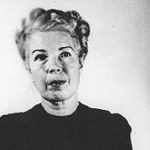 War is tough enough without having a traitor in the mix, and when a traitor is involved, things get even worse. One such traitor of World War II, was Mildred Gillars, aka Axis Sally. Apparently, Gillars, an American, was a opportunist. In 1940, she went to work as an announcer with the Reichs-Rundfunk-Gesellschaft (RRG), German State Radio. At the time, I suppose that she did nothing wrong…up to that point. In 1941, the US State Department was advising American nationals to return home, but Gillars chose to remain because her fiancé, Paul Karlson, a naturalized German citizen, said he would never marry her if she returned to the United States. Then, Karlson was sent to the Eastern Front, where he was killed in action. Gillars still did not return home.
War is tough enough without having a traitor in the mix, and when a traitor is involved, things get even worse. One such traitor of World War II, was Mildred Gillars, aka Axis Sally. Apparently, Gillars, an American, was a opportunist. In 1940, she went to work as an announcer with the Reichs-Rundfunk-Gesellschaft (RRG), German State Radio. At the time, I suppose that she did nothing wrong…up to that point. In 1941, the US State Department was advising American nationals to return home, but Gillars chose to remain because her fiancé, Paul Karlson, a naturalized German citizen, said he would never marry her if she returned to the United States. Then, Karlson was sent to the Eastern Front, where he was killed in action. Gillars still did not return home.
On December 7, 1941, Gillars was working in the studio when the Japanese attack on Pearl Harbor was announced. She broke down in front of her colleagues and denounced their allies in the east. “I told them what I thought about Japan and that the Germans would soon find out about them,” she recalled. “The shock was terrific. I lost all discretion.” This may have been the the last time she had any self respect. She later said that she knew that her outburst could send her to a concentration camp, so faced with the prospect of joblessness or prison, the frightened Gillars produced a written oath of allegiance to Germany and returned to work. She sold out. Her duties were initially limited to announcing records and participating in chat shows, but treason is a slippery slope. Gillars’ broadcasts initially were largely apolitical, but that changed in 1942, when Max Otto Koischwitz, the program director in the USA Zone at the RRG, cast Gillars in a new show called Home Sweet Home. She soon acquired several names amongst her GI audience, including the Berlin Bitch, Berlin Babe, Olga, and Sally, but the one most common was “Axis Sally”. This name probably came when asked on air to describe herself, Gillars had said she was “the Irish type… a real Sally.”
As her broadcasts progressed, Gillars began doing a show called Home Sweet Home Hour. This show ran from December 24, 1942, until 1945. It was a regular propaganda program, the purpose of which was to make US forces in Europe feel homesick. A running theme of these broadcasts was the infidelity of soldiers’ wives and sweethearts while the listeners were stationed in Europe and North Africa. I’m was designed to promote depression. I guess her aversion to the ways of the Japanese and Germans wasn’t so strong after all. She also did a show called Midge-at-the-Mike, which broadcast from March to late fall 1943. I this program, she played American songs interspersed with defeatist propaganda, anti-Semitic rhetoric and attacks on Franklin D. Roosevelt. And she did the GI’s Letter-box and Medical Reports 1944, which was directed at the US home audience. In this show, Gillars used information on wounded and captured US airmen to cause fear and worry in their families. After D-Day, June 6, 1944, US soldiers wounded and captured in France were also reported on. Gillars and Koischwitz worked for a time from Chartres and Paris for this purpose, visiting hospitals and interviewing POWs. In 1943 they had toured POW camps in Germany, interviewing captured Americans and recording their messages for their families in the US. The interviews were then edited for broadcast as though the speakers were well-treated or sympathetic to the Nazi cause. Gillars made her most notorious broadcast on June 5, 1944, just prior to the D-Day invasion of Normandy, France, in a radio play written by Koischwitz, Vision Of Invasion. She played Evelyn, an Ohio mother, who dreams that her son had died a horrific death on a ship in the English Channel during an attempted invasion of Occupied Europe.
After the war, Gillars mingled with the people of Germany, until her capture. Gillars was indicted on September 10, 1948, and charged with ten counts of treason, but only eight were proceeded with at her trial, which began 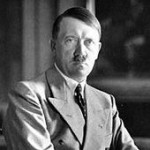 on January 25, 1949. The prosecution relied on the large number of her programs recorded by the FCC, stationed in Silver Hill, Maryland, to show her active participation in propaganda activities against the United States. It was also shown that she had taken an oath of allegiance to Hitler. The defense argued that her broadcasts stated unpopular opinions but did not amount to treasonable conduct. It was also argued that she was under the hypnotic influence of Koischwitz and therefore not fully responsible for her actions until after his death. On March 10, 1949, the jury convicted Gillars on just one count of treason, that of making the Vision Of Invasion broadcast. She was sentenced to 10 to 30 years in prison, and a $10,000 fine. In 1950, a federal appeals court upheld the sentence. She died June 25, 1988 at the age of 87.
on January 25, 1949. The prosecution relied on the large number of her programs recorded by the FCC, stationed in Silver Hill, Maryland, to show her active participation in propaganda activities against the United States. It was also shown that she had taken an oath of allegiance to Hitler. The defense argued that her broadcasts stated unpopular opinions but did not amount to treasonable conduct. It was also argued that she was under the hypnotic influence of Koischwitz and therefore not fully responsible for her actions until after his death. On March 10, 1949, the jury convicted Gillars on just one count of treason, that of making the Vision Of Invasion broadcast. She was sentenced to 10 to 30 years in prison, and a $10,000 fine. In 1950, a federal appeals court upheld the sentence. She died June 25, 1988 at the age of 87.
 It’s hard to believe that four years have passed since my father-in-law, Walt Schulenberg passed away. Of course, if you asked my mother-in-law, his wife, Joann, he is still here. Alzheimer’s Disease has taken away the memory of his loss, for her anyway. Sometime I think her loss of that memory clouds my own feelings about to too. She often calls my husband, Bob…her son, Walt, and of course, he pretends that he is. Or she asks about him, and we tell her that he went to Walmart. In many ways, her loss of the memory of his passing has kept him closer to all of us. Pretending that he is still here makes is seem real somehow, because the mind makes it seem so.
It’s hard to believe that four years have passed since my father-in-law, Walt Schulenberg passed away. Of course, if you asked my mother-in-law, his wife, Joann, he is still here. Alzheimer’s Disease has taken away the memory of his loss, for her anyway. Sometime I think her loss of that memory clouds my own feelings about to too. She often calls my husband, Bob…her son, Walt, and of course, he pretends that he is. Or she asks about him, and we tell her that he went to Walmart. In many ways, her loss of the memory of his passing has kept him closer to all of us. Pretending that he is still here makes is seem real somehow, because the mind makes it seem so.
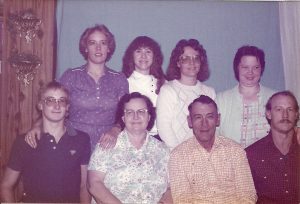 Dad was the glue in the family. Mom might have been too, had Alzheimer’s Disease not taken that spot from her. Dad’s passing brought a different family unit with it. We don’t get together quite as often now. It makes me sad, because I know how much he loved his family, and how important it was to him that we stay close. We have stayed close, just not in quite the same way as it was when he was still with us. Family was everything to him, but of course, he understood how busy people can get. The main thing he would have wanted us to do, is to be there for the love of his life, and in that respect, I know that he knew before he ever left, that we would take good care of her, and so we have.
Dad was the glue in the family. Mom might have been too, had Alzheimer’s Disease not taken that spot from her. Dad’s passing brought a different family unit with it. We don’t get together quite as often now. It makes me sad, because I know how much he loved his family, and how important it was to him that we stay close. We have stayed close, just not in quite the same way as it was when he was still with us. Family was everything to him, but of course, he understood how busy people can get. The main thing he would have wanted us to do, is to be there for the love of his life, and in that respect, I know that he knew before he ever left, that we would take good care of her, and so we have.
 My father-in-law, was a sweet loving man who loved to joke with the family. He loved it when everyone was together and having a great laugh. It made him feel good to know that no matter what, our day had been like, we could come together and enjoy each other’s company. He was a great dad, grandfather, and great grandfather. He loved those babies. I suppose that is why they had six kids of their own. Dad loved to see the kids playing at his house, and he was never too busy to get in there and play too. The years since his passing have flown by, and that makes me especially sad, because I miss him very much. I wish we could go back in time and have our loved ones back, but that just can’t be. I know you are happy in Heaven Dad, and that we will see you again, but I sure miss you in the here and now.
My father-in-law, was a sweet loving man who loved to joke with the family. He loved it when everyone was together and having a great laugh. It made him feel good to know that no matter what, our day had been like, we could come together and enjoy each other’s company. He was a great dad, grandfather, and great grandfather. He loved those babies. I suppose that is why they had six kids of their own. Dad loved to see the kids playing at his house, and he was never too busy to get in there and play too. The years since his passing have flown by, and that makes me especially sad, because I miss him very much. I wish we could go back in time and have our loved ones back, but that just can’t be. I know you are happy in Heaven Dad, and that we will see you again, but I sure miss you in the here and now.
 Every war has one thing in common…there are two opposing sides. That can make for a volatile situation, even years after the war is over. Take our own Civil War. That war ended in 1865, but to this day, there are those who think we should tear down any and all memorials to the heroes of the South, which of course, lost the war. It’s a tough situation, but when you think about it, is a general from the South any less brave in battle. It is all a part of he fabric that forms our nation. They did not win the war, but as we have all told our children about sports, “It’s not whether you win or lose, but how you played the game.” Now, I know that war isn’t a game, although some have indicated that it is, nevertheless, most soldiers from the South fought as bravely and as honorably as those from the north. Everyone knows that the Confederate flag is not the flag of the United States, but it is a piece of it’s history, and history is history. It is not something we should be defacing, but rather honoring, because the fought the good fight.
Every war has one thing in common…there are two opposing sides. That can make for a volatile situation, even years after the war is over. Take our own Civil War. That war ended in 1865, but to this day, there are those who think we should tear down any and all memorials to the heroes of the South, which of course, lost the war. It’s a tough situation, but when you think about it, is a general from the South any less brave in battle. It is all a part of he fabric that forms our nation. They did not win the war, but as we have all told our children about sports, “It’s not whether you win or lose, but how you played the game.” Now, I know that war isn’t a game, although some have indicated that it is, nevertheless, most soldiers from the South fought as bravely and as honorably as those from the north. Everyone knows that the Confederate flag is not the flag of the United States, but it is a piece of it’s history, and history is history. It is not something we should be defacing, but rather honoring, because the fought the good fight.
President Regan felt the same way when he visited Germany on May 5, 1985. The Holocaust was a horrible 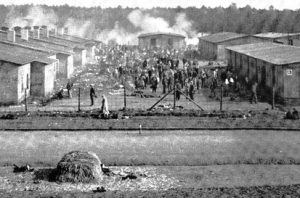 event, and not one that the majority of the German people agreed with, but they were in a difficult place too. They were following orders. Had they not done so, they would have been killed…here was no doubt. So, when Reagan went to Germany and to the cemeteries of the fallen German soldiers, should he have been disrespectful…of course not. He was a visitor in their country, and whether their politics was right or wrong, these were their fallen heroes. They were fathers, sons, brothers, uncles, grandfathers to someone in Germany, and they were loved. As Reagan said that day, “Here they lie. Never to hope. Never to pray. Never to love. Never to heal. Never to laugh. Never to cry.” Lives taken…too soon, by war, and that made them a nation’s heroes.
event, and not one that the majority of the German people agreed with, but they were in a difficult place too. They were following orders. Had they not done so, they would have been killed…here was no doubt. So, when Reagan went to Germany and to the cemeteries of the fallen German soldiers, should he have been disrespectful…of course not. He was a visitor in their country, and whether their politics was right or wrong, these were their fallen heroes. They were fathers, sons, brothers, uncles, grandfathers to someone in Germany, and they were loved. As Reagan said that day, “Here they lie. Never to hope. Never to pray. Never to love. Never to heal. Never to laugh. Never to cry.” Lives taken…too soon, by war, and that made them a nation’s heroes.
No two sides will ever agree, and emotions run high after a war, but sometimes people take things too far…retaliating for things they believe were wrong, years and even centuries after the events took place. The dead  are dead, and their memorials should be left alone, whether they are private, state, or national. To someone, somewhere, their efforts were heroic, and just because we have a different view of the things they stood for, does not give is the right to terrorize their graves and memorials. I suppose that many people would argue this point with me, and let it be known that I am not condoning the wrongs done by evil nations, I an simply saying that we should leave the memorials alone, because they do no harm. If people want to make a statement, they should teach their children right from wrong, so that they understand the difference between a cause, and a heroic soldier of that cause. One could arguably be condemned, while the other should not be.
are dead, and their memorials should be left alone, whether they are private, state, or national. To someone, somewhere, their efforts were heroic, and just because we have a different view of the things they stood for, does not give is the right to terrorize their graves and memorials. I suppose that many people would argue this point with me, and let it be known that I am not condoning the wrongs done by evil nations, I an simply saying that we should leave the memorials alone, because they do no harm. If people want to make a statement, they should teach their children right from wrong, so that they understand the difference between a cause, and a heroic soldier of that cause. One could arguably be condemned, while the other should not be.
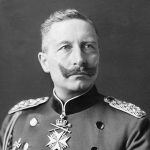 While Germany was willing to go to war, they had, nevertheless, a healthy fear of the United States. During World War I, Germany introduced unrestricted submarine warfare. It was early 1915, and Germany decided that the area around the British Isles was a war zone, and all merchant ships, including those from neutral countries, would be attacked by the German navy. That action set in motion a series of attacks on merchant ships, that finally led to the sinking of the British passenger ship, RMS Lusitania on May 7, 1915. It was at this point that President Woodrow Wilson decided that it was time to pressure the German government to curb their naval actions. Because the German government didn’t want to antagonize the United States, they agreed to put restrictions on the submarine policy going forward, which angered many of their naval leaders, including the naval commander in chief, Admiral Alfred von Tirpitz, who showed his frustration by resigning in March 1916.
While Germany was willing to go to war, they had, nevertheless, a healthy fear of the United States. During World War I, Germany introduced unrestricted submarine warfare. It was early 1915, and Germany decided that the area around the British Isles was a war zone, and all merchant ships, including those from neutral countries, would be attacked by the German navy. That action set in motion a series of attacks on merchant ships, that finally led to the sinking of the British passenger ship, RMS Lusitania on May 7, 1915. It was at this point that President Woodrow Wilson decided that it was time to pressure the German government to curb their naval actions. Because the German government didn’t want to antagonize the United States, they agreed to put restrictions on the submarine policy going forward, which angered many of their naval leaders, including the naval commander in chief, Admiral Alfred von Tirpitz, who showed his frustration by resigning in March 1916.
On March 24, 1916, soon after Tirpitz’s resignation, a German U-boat submarine attacked the French passenger steamer Sussex, in the English Channel, thinking it was a British ship equipped to lay explosive mines. It was apparently an honest mistake, and the ship did not sink. Still, 50 people were killed and many 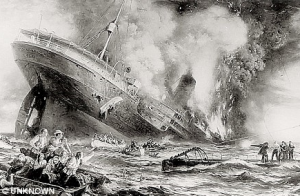 more injured, including several Americans. On April 19, in an address to the United States Congress, President Wilson took a firm stance, stating that unless the Imperial German Government agreed to immediately abandon its present methods of warfare against passenger and freight carrying vessels the United States would have no choice but to sever diplomatic relations with the Government of the German Empire altogether.
more injured, including several Americans. On April 19, in an address to the United States Congress, President Wilson took a firm stance, stating that unless the Imperial German Government agreed to immediately abandon its present methods of warfare against passenger and freight carrying vessels the United States would have no choice but to sever diplomatic relations with the Government of the German Empire altogether.
After Wilson’s speech, the US ambassador to Germany, James W. Gerard, spoke directly to Kaiser Wilhelm on May 1 at the German army headquarters at Charleville in eastern France. After Gerard protested the continued German submarine attacks on merchant ships, the Kaiser in turn denounced the American government’s compliance with the Allied naval blockade of Germany, in place since late 1914. Nevertheless, Germany could not risk American entry into the war against them, so when Gerard urged the Kaiser to provide assurances of a change in the submarine policy, the Kaiser agreed.
On May 6, the German government signed the so-called Sussex Pledge, promising to stop the indiscriminate sinking of non-military ships. According to the pledge, merchant ships would be searched, and sunk only if they 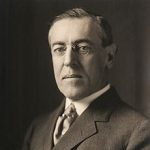 were found to be carrying contraband materials. Furthermore, no ship would be sunk before safe passage had been provided for the ship’s crew and its passengers. Gerard was skeptical of the intentions of the Germans, and wrote in a letter to the United States State Department that “German leaders, forced by public opinion, and by the von Tirpitz and Conservative parties would take up ruthless submarine warfare again, possibly in the autumn, but at any rate about February or March, 1917.” Gerard was right, and on February 1, 1917, Germany announced the resumption of unrestricted submarine warfare. Two days later, Wilson announced a break in diplomatic relations with the German government, and on April 6, 1917, the United States formally entered World War I on the side of the Allies.
were found to be carrying contraband materials. Furthermore, no ship would be sunk before safe passage had been provided for the ship’s crew and its passengers. Gerard was skeptical of the intentions of the Germans, and wrote in a letter to the United States State Department that “German leaders, forced by public opinion, and by the von Tirpitz and Conservative parties would take up ruthless submarine warfare again, possibly in the autumn, but at any rate about February or March, 1917.” Gerard was right, and on February 1, 1917, Germany announced the resumption of unrestricted submarine warfare. Two days later, Wilson announced a break in diplomatic relations with the German government, and on April 6, 1917, the United States formally entered World War I on the side of the Allies.

 My son-in-law, Travis Royce is without a doubt, the most social person in our family. Travis can talk to anyone. There isn’t a shy bone in his body. I think that is one thing that made him such a great DJ when he and my daughter, Amy lived here in Casper. Travis was born in San Diego, and spent a number of years in Puyallup, Washington as a child. He loved it there, and loves the coastal areas in general, so after their children graduated from high school, they made the move to the Seattle area, and now to the Bellingham area. They truly love the area, and I can understand that, because it is quite beautiful there. I don’t know if would love the rain, but they seem to, so it’s all good.
My son-in-law, Travis Royce is without a doubt, the most social person in our family. Travis can talk to anyone. There isn’t a shy bone in his body. I think that is one thing that made him such a great DJ when he and my daughter, Amy lived here in Casper. Travis was born in San Diego, and spent a number of years in Puyallup, Washington as a child. He loved it there, and loves the coastal areas in general, so after their children graduated from high school, they made the move to the Seattle area, and now to the Bellingham area. They truly love the area, and I can understand that, because it is quite beautiful there. I don’t know if would love the rain, but they seem to, so it’s all good.
Travis can make friends wherever he goes, and he loves to entertain…especially with a barbeque. He loves to go all out with the feast he puts on too. He might cook steaks, lobster, or jalapeno poppers…or just burgers. No matter what’s cooking Travis is a good cook, and he is a great host. As I said, he loves to entertain, and he is quick witted, so there is never a dull moment. When Travis is around, there is always a joke going on. Even when my daughter, Amy and Travis aren’t entertaining, they love to sit out in their back yard with a fire going, just enjoying the peace and quiet. Their home is out in the country…or at the edge of town anyway, so it is quiet a quiet neighborhood.
Now you might think that with their love of the country life, quiet would be the order of the day, but that is not always the case. As summer approaches, both Amy and Travis look forward to getting out their motorcycle 
 and cruising the area. With all of the water destinations in their vicinity, they have a lot of pretty drives that they can take. Travis is definitely not a snow lover, so Western Washington is pretty ideal. He wants as many warm months as possible. I can relate to that, but I don’t know that Washington is the ideal place. Still, as Amy says, they don’t like the extreme heat either, so there you have it. All I care about is that Travis loves my girl, and he does. Today is Travis’ birthday. Happy birthday Travis!! Have a great day!! We love you!!
and cruising the area. With all of the water destinations in their vicinity, they have a lot of pretty drives that they can take. Travis is definitely not a snow lover, so Western Washington is pretty ideal. He wants as many warm months as possible. I can relate to that, but I don’t know that Washington is the ideal place. Still, as Amy says, they don’t like the extreme heat either, so there you have it. All I care about is that Travis loves my girl, and he does. Today is Travis’ birthday. Happy birthday Travis!! Have a great day!! We love you!!
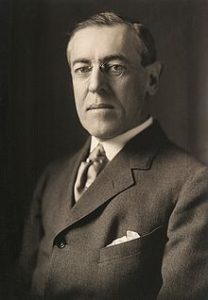 Desperate times call for desperate measures…and sometimes, they call for pleading. On March 23, 1918, two days after the launch of a major German offensive in northern France, British Prime Minister David Lloyd George telegraphed the British ambassador in Washington, Lord Reading, urging him to explain to United States President Woodrow Wilson that without help from the US, “we cannot keep our divisions supplied for more than a short time at the present rate of loss. This situation is undoubtedly critical and if America delays now she may be too late.” Of course, nothing happens quickly in government, but this was a different thing. In response, President Wilson agreed to send a direct order to the commander in chief of the American Expeditionary Force, General John J. Pershing, telling him that American troops already in France should join British and French divisions immediately, without waiting for enough soldiers to arrive to form brigades of their own. Pershing agreed to this on April 2, providing a boost in morale for the exhausted Allies.
Desperate times call for desperate measures…and sometimes, they call for pleading. On March 23, 1918, two days after the launch of a major German offensive in northern France, British Prime Minister David Lloyd George telegraphed the British ambassador in Washington, Lord Reading, urging him to explain to United States President Woodrow Wilson that without help from the US, “we cannot keep our divisions supplied for more than a short time at the present rate of loss. This situation is undoubtedly critical and if America delays now she may be too late.” Of course, nothing happens quickly in government, but this was a different thing. In response, President Wilson agreed to send a direct order to the commander in chief of the American Expeditionary Force, General John J. Pershing, telling him that American troops already in France should join British and French divisions immediately, without waiting for enough soldiers to arrive to form brigades of their own. Pershing agreed to this on April 2, providing a boost in morale for the exhausted Allies.
The non-stop German offensive continued to take its toll throughout the month of April, however, because the majority of American troops in Europe, who were now arriving at a rate of 120,000 a month, were still not sent into battle. In a meeting of the Supreme War Council of Allied leaders at Abbeville, near the coast of the English Channel, which began on May 1, 1918, Clemenceau, Lloyd George and General Ferdinand Foch, the recently named Generalissimo of all Allied forces on the Western Front, was trying hard to persuade Pershing to send all the existing American troops to the front at once. Pershing resisted, reminding the group that the United States had entered the war “independently” of the other Allies, and indeed, the United States would insist during and after the war on being known as an “associate” rather than a full-fledged ally. He further stated, “I do not suppose that the American army is to be entirely at the disposal of the French and British commands.” I’m sure his remarks brought with them, much concern.
On May 2, the second day of the meeting, the debate continued, with Pershing holding his ground in the face of 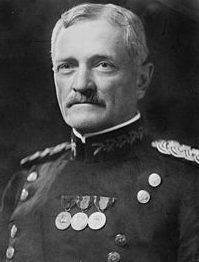 heated appeals by the other leaders. He proposed a compromise, which in the end Lloyd George and Clemenceau had no choice but to accept. Pershing proposed that the United States would send the 130,000 troops arriving in May, as well as another 150,000 in June, to join the Allied front line. He would not make provision for July. This agreement meant that of the 650,000 American troops in Europe by the end of May 1918, roughly one third would go to battle that summer. The other two thirds would not go to the front until they were organized, trained and ready to fight as a purely American army, which Pershing estimated would not happen until the late spring of 1919. I’m sure Pershing’s concern was poorly trained soldiers fighting with little chance of winning. Still, by the time the war ended on November 11, 1918, more than 2 million American soldiers had served on the battlefields of Western Europe, and some 50,000 of them had lost their lives. The United States did go into battle and help win that war, but many thought that the delays cost lives.
heated appeals by the other leaders. He proposed a compromise, which in the end Lloyd George and Clemenceau had no choice but to accept. Pershing proposed that the United States would send the 130,000 troops arriving in May, as well as another 150,000 in June, to join the Allied front line. He would not make provision for July. This agreement meant that of the 650,000 American troops in Europe by the end of May 1918, roughly one third would go to battle that summer. The other two thirds would not go to the front until they were organized, trained and ready to fight as a purely American army, which Pershing estimated would not happen until the late spring of 1919. I’m sure Pershing’s concern was poorly trained soldiers fighting with little chance of winning. Still, by the time the war ended on November 11, 1918, more than 2 million American soldiers had served on the battlefields of Western Europe, and some 50,000 of them had lost their lives. The United States did go into battle and help win that war, but many thought that the delays cost lives.
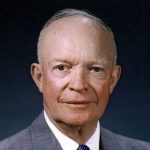
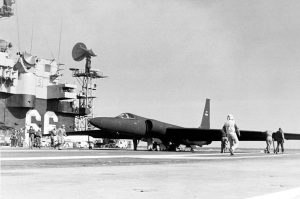 Americans don’t really like to think that our military is out spying on other countries, but like it or not, we spy on them, and they spy on us. We know it and they know it. So, spying is not really the problem…it’s getting caught that causes a problem. Getting caught is the ultimate faux pas, and that is what happened on May 1, 1960, when an American U-2 spy plane was shot down over the Soviet Union while conducting espionage. The plane was being operated by Central Intelligence Agency pilot Francis Powers, under the order of the CIA. The U-2 spy plane was the brainchild of the CIA, and it was in all reality, a sophisticated technological marvel. It could travel at altitudes of up to 70,000 feet, and it was equipped with state-of-the-art photography equipment that could, according to the CIA, take “high-resolution pictures of headlines in Russian newspapers as it flew overhead.” The flights over the Soviet Union began in mid-1956, and the CIA assured President Eisenhower that the Soviets did not possess anti-aircraft weapons sophisticated enough to shoot down the high-altitude planes. How wrong they were.
Americans don’t really like to think that our military is out spying on other countries, but like it or not, we spy on them, and they spy on us. We know it and they know it. So, spying is not really the problem…it’s getting caught that causes a problem. Getting caught is the ultimate faux pas, and that is what happened on May 1, 1960, when an American U-2 spy plane was shot down over the Soviet Union while conducting espionage. The plane was being operated by Central Intelligence Agency pilot Francis Powers, under the order of the CIA. The U-2 spy plane was the brainchild of the CIA, and it was in all reality, a sophisticated technological marvel. It could travel at altitudes of up to 70,000 feet, and it was equipped with state-of-the-art photography equipment that could, according to the CIA, take “high-resolution pictures of headlines in Russian newspapers as it flew overhead.” The flights over the Soviet Union began in mid-1956, and the CIA assured President Eisenhower that the Soviets did not possess anti-aircraft weapons sophisticated enough to shoot down the high-altitude planes. How wrong they were.
 On May 1, 1960, over Russia, a U-2 flight piloted by Francis Gary Powers disappeared, while doing reconnaissance. The CIA reassured the president that, even if the plane had been shot down, it was equipped with self-destruct mechanisms that would render any wreckage unrecognizable and the pilot was instructed to kill himself in such a situation. Looking at the wreckage, I suppose it was unrecognizable…to a degree, at least in the picture, but how can a pilot be ordered to kill himself. I don’t know about you, but I would have to disobey that order. Apparently Powers felt the same way, because he parachuted out, rather than crash with the plane. Still, based on this information, the United States government issued a statement indicating that a weather plane had veered off course and supposedly crashed somewhere in the Soviet Union. Khrushchev took great pleasure in embarrassing the United States when he produced not only the mostly-intact wreckage of the U-2, but also the captured pilot…very much alive.
On May 1, 1960, over Russia, a U-2 flight piloted by Francis Gary Powers disappeared, while doing reconnaissance. The CIA reassured the president that, even if the plane had been shot down, it was equipped with self-destruct mechanisms that would render any wreckage unrecognizable and the pilot was instructed to kill himself in such a situation. Looking at the wreckage, I suppose it was unrecognizable…to a degree, at least in the picture, but how can a pilot be ordered to kill himself. I don’t know about you, but I would have to disobey that order. Apparently Powers felt the same way, because he parachuted out, rather than crash with the plane. Still, based on this information, the United States government issued a statement indicating that a weather plane had veered off course and supposedly crashed somewhere in the Soviet Union. Khrushchev took great pleasure in embarrassing the United States when he produced not only the mostly-intact wreckage of the U-2, but also the captured pilot…very much alive.
It was at this point that President Eisenhower had to publicly admit that it was indeed a United States spy plane. On May 16, a major summit between the United States, the Soviet Union, Great Britain, and France 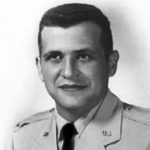
 began in Paris. Issues to be discussed included the status of Berlin and nuclear arms control, but as the meeting opened, Khrushchev launched into a tirade against the United States and Eisenhower and then stormed out of the summit. The meeting collapsed immediately and the summit was called off. Eisenhower considered the “stupid U-2 mess” one of the worst debacles of his presidency. The summit was supposed to solve some things, but it ended up making matters much worse.
began in Paris. Issues to be discussed included the status of Berlin and nuclear arms control, but as the meeting opened, Khrushchev launched into a tirade against the United States and Eisenhower and then stormed out of the summit. The meeting collapsed immediately and the summit was called off. Eisenhower considered the “stupid U-2 mess” one of the worst debacles of his presidency. The summit was supposed to solve some things, but it ended up making matters much worse.
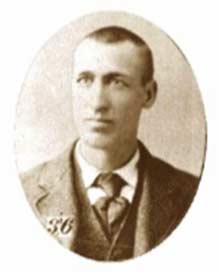 Jonathan Luther “John” “Casey” Jones was born on March 14, 1863. As a boy, he lived near Cayce, Kentucky, which is where his nickname of “Cayce” came from, but he chose to spell it “Casey”. Jones went to work for the Mobile & Ohio Railroad and performed well and was promoted to brakeman on the Columbus, Kentucky to Jackson, Tennessee route, and then to fireman on the Jackson, Tennessee to Mobile, Alabama route. That caught my attention, because my grandfathers and other family members worked for the railroad too, but it was not working on the railroad that made Casey famous…at least not totally anyway. Casey always dreamed of being an engineer. He worked hard, but did receive nine citations for rule violations, and 145 total days suspended. In the year prior to his death, Jones had not been cited for any rules infractions. His dreams came true, but not in the way he expected. In the summer 1887, a yellow fever epidemic struck many train crews on the neighboring Illinois Central Railroad, providing an unexpected opportunity for faster promotion of firemen on that line. On March 1, 1888, Jones switched to the Illinois Central Railroad, taking a freight locomotive between Jackson, Tennessee and Water Valley, Mississippi.
Jonathan Luther “John” “Casey” Jones was born on March 14, 1863. As a boy, he lived near Cayce, Kentucky, which is where his nickname of “Cayce” came from, but he chose to spell it “Casey”. Jones went to work for the Mobile & Ohio Railroad and performed well and was promoted to brakeman on the Columbus, Kentucky to Jackson, Tennessee route, and then to fireman on the Jackson, Tennessee to Mobile, Alabama route. That caught my attention, because my grandfathers and other family members worked for the railroad too, but it was not working on the railroad that made Casey famous…at least not totally anyway. Casey always dreamed of being an engineer. He worked hard, but did receive nine citations for rule violations, and 145 total days suspended. In the year prior to his death, Jones had not been cited for any rules infractions. His dreams came true, but not in the way he expected. In the summer 1887, a yellow fever epidemic struck many train crews on the neighboring Illinois Central Railroad, providing an unexpected opportunity for faster promotion of firemen on that line. On March 1, 1888, Jones switched to the Illinois Central Railroad, taking a freight locomotive between Jackson, Tennessee and Water Valley, Mississippi.
Jones was a bit of a risk taker, but I doubt if some of the people who knew about some of his “risks” would hold that against him. A little-known example of Jones’ heroic act saved the life of a little girl. As Jones’ train approached Michigan City, Mississippi, he had walked out on the running board to oil the relief valves. He had finished well before they arrived at the station, as planned, and was returning to the cab when he noticed a group of small children dart in front of the train some 60 yards ahead. They all cleared the rails easily except for a little girl who suddenly froze in fear at the sight of the oncoming iron horse. Jones shouted to Stevenson to reverse the train and yelled to the girl to get off the tracks in almost the same breath. Then he realize that she was frozen in fear. He raced to the tip of the cowcatcher and braced himself on it, reaching out as far as he could to pull the frightened but unharmed girl from the rails.
On April 30, 1900, while Casey was running the Cannonball Express, and trying to make up for a late start, it would be his heroics that would cost him his life. As Casey was coming into Vaughan, Mississippi, he did not know that three separate trains were in the station at Vaughan…double-header freight train No. 83 and long freight train No. 72 were both in the passing track to the east of the main line. As the combined length of the trains was ten cars longer than the length of the east passing track, some of the cars were stopped on the main line. The two sections of northbound local passenger train No. 26 had arrived from Canton earlier, and required a “saw by” for them to get to the “house track” west of the main line. The “saw by” maneuver required that No. 83 back up (onto the main line) to allow No. 72 to move northward and pull its overlapping cars off the main line and onto the east side track from the south switch, thus allowing the two sections of No. 26 to gain access to the west house track. The “saw by”, however, left the rear cars of No. 83 overlapping above the north switch and on the main line…right in Jones’ path. As workers prepared a second “saw by” to let Jones pass, an air hose broke on No. 72, locking its brakes and leaving the last four cars of No. 83 on the main line.
Jones was almost back on schedule, running at about 75 miles per hour toward Vaughan, and traveling through a 1.5 mile left-hand curve that blocked his view. Webb’s view from the left side of the train was better, and he was first to see the red lights of the caboose on the main line. “Oh my Lord, there’s something on the main line!” he yelled to Jones. Jones quickly yelled back “Jump Sim, jump!” to Webb, who crouched down and jumped from the train, about 300 feet before impact, and knocked unconscious by his fall. The last thing Webb heard as he jumped was the long, piercing scream of the whistle as Jones warned anyone still in the freight train looming ahead. He was only two minutes behind schedule. Jones reversed the throttle and slammed the airbrakes into  emergency stop, but “Ole 382” quickly plowed through a wooden caboose, a car load of hay, another of corn, and halfway through a car of timber before leaving the track. He had reduced his speed from about 75 miles per hour to about 35 miles per hour when he hit. Because Jones stayed on board to slow the train, he saved the passengers from serious injury and death. He was the only fatality of the collision. His watch stopped at the time of impact…3:52 am on April 30, 1900. Legend holds that when his body was pulled from the wreckage, his hands still clutched the whistle cord and brake. A stretcher was brought from the baggage car on No. 1, and crewmen of the other trains carried his body to the depot, a half-mile away.
emergency stop, but “Ole 382” quickly plowed through a wooden caboose, a car load of hay, another of corn, and halfway through a car of timber before leaving the track. He had reduced his speed from about 75 miles per hour to about 35 miles per hour when he hit. Because Jones stayed on board to slow the train, he saved the passengers from serious injury and death. He was the only fatality of the collision. His watch stopped at the time of impact…3:52 am on April 30, 1900. Legend holds that when his body was pulled from the wreckage, his hands still clutched the whistle cord and brake. A stretcher was brought from the baggage car on No. 1, and crewmen of the other trains carried his body to the depot, a half-mile away.
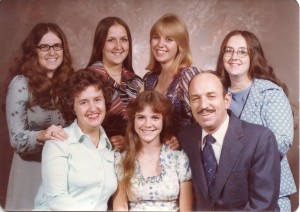 For the first 51 years of my life, my birthday was always celebrated with my dad. It was our tradition. I was supposed to be born on his birthday anyway, and what difference did two days make…for birthday parties anyway. We always like having our party together. Now that Dad is in Heaven, we can no longer do that, on Earth anyway, and believe me…it has been a long ten years. He is always in my thoughts on my birthday, and every day, as is my mom.
For the first 51 years of my life, my birthday was always celebrated with my dad. It was our tradition. I was supposed to be born on his birthday anyway, and what difference did two days make…for birthday parties anyway. We always like having our party together. Now that Dad is in Heaven, we can no longer do that, on Earth anyway, and believe me…it has been a long ten years. He is always in my thoughts on my birthday, and every day, as is my mom.
I think that as we get older, our birthday becomes a day to reflect on all the blessings we have been given. In my mind, there is no greater blessing than the parents who have me life in the first place. I just couldn’t have asked for better parents than they were. They taught me all of life’s important lessons…the ones I needed to know to become an independent and responsible woman, and trust me when I say that I was not always the easiest student. I would not be where I am today, were it not for them. I am also thankful for my sweet sisters, Cheryl Masterson, Caryl Reed, Alena Stevens, and Allyn Hadlock…and for their families. We always had each other, and we knew that we always would. I knew I could count on them…no matter what.
As I grew up, I met the love of my life, Bob Schulenberg. He is my support system through everything life brings my way. When he took our wedding vows over 42 years ago, he meant every word, and he has kept 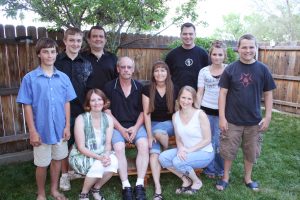 every vow perfectly. He has been a huge blessing in my life. He is the father of my girls, Corrie Petersen and Amy Royce. My girls…wow!! Where do I begin? Besides being the wonderful children they were and the beautiful women they have become, they were always there, willing to do whatever was needed, especially in the years while we were taking care of their grandparents. We couldn’t have done it without them. Caregiving is truly a unique situation, and anyone who has done it knows that it definitely takes a village. My girls were an intricate part of that village, as were their husbands, Kevin Petersen and Travis Royce, who both sacrificed so much time with their wives and children so they could be there for their grandparents. My grandchildren…another wow! How many children, ten and under, willing come in and become CNAs in every sense of the word…and do it well. None I can think of. Each of my grandchildren, Chris Petersen, Shai Royce, Caalab Royce, and Josh Petersen, are more of a blessing to me than they can ever know. I want my family to know that I am so proud of each and every one of you.
every vow perfectly. He has been a huge blessing in my life. He is the father of my girls, Corrie Petersen and Amy Royce. My girls…wow!! Where do I begin? Besides being the wonderful children they were and the beautiful women they have become, they were always there, willing to do whatever was needed, especially in the years while we were taking care of their grandparents. We couldn’t have done it without them. Caregiving is truly a unique situation, and anyone who has done it knows that it definitely takes a village. My girls were an intricate part of that village, as were their husbands, Kevin Petersen and Travis Royce, who both sacrificed so much time with their wives and children so they could be there for their grandparents. My grandchildren…another wow! How many children, ten and under, willing come in and become CNAs in every sense of the word…and do it well. None I can think of. Each of my grandchildren, Chris Petersen, Shai Royce, Caalab Royce, and Josh Petersen, are more of a blessing to me than they can ever know. I want my family to know that I am so proud of each and every one of you.
And no reflection over one’s life would be complete without considering the blessing of loving in-laws. Bob’s parents, Walt and Joann Schulenberg became like a second set of parents to me, and with my marriage I also  gained four sweet sisters-in-law, Marlyce Schulenberg, Debbie Cook, Jennifer Parmely, and Brenda Schulenberg, as well as a brother-in-law, Ron Schulenberg. They, along with their families have made my life complete. As my birthday arrives, it is with sadness, because of those who are in Heaven now, but also with a deep understanding of just how very blessed my life has been. I thank God for each and everyone of my family members, as well as wonderful friends, like Jim and Julie Stengel, Carrie Beauchamp, and Becky Thorne, who have also been a great part of what makes my life blessed. Looking at my past, I know that I wouldn’t change a thing. It’s perfect just the way it is. Life doesn’t get sweeter than this.
gained four sweet sisters-in-law, Marlyce Schulenberg, Debbie Cook, Jennifer Parmely, and Brenda Schulenberg, as well as a brother-in-law, Ron Schulenberg. They, along with their families have made my life complete. As my birthday arrives, it is with sadness, because of those who are in Heaven now, but also with a deep understanding of just how very blessed my life has been. I thank God for each and everyone of my family members, as well as wonderful friends, like Jim and Julie Stengel, Carrie Beauchamp, and Becky Thorne, who have also been a great part of what makes my life blessed. Looking at my past, I know that I wouldn’t change a thing. It’s perfect just the way it is. Life doesn’t get sweeter than this.

 Sometimes in life, a person has the unique opportunity to basically go full circle. It’s not exactly like going back to your roots, because many people have done that…myself included. Sometimes though, as in the case with my youngest grandson, Josh Petersen and his dad, Kevin, you have the opportunity to go back to a birth event, and see it in an entirely different light. When Josh was born on September 9, 1998…five weeks early, his lungs just weren’t quite strong enough to maintain his oxygen levels without assistance. It was decided that he would be taken to Presbyterian Saint Luke’s Hospital in Denver, Colorado via Life Flight’s Learjet. Since his mother, my daughter Corrie Petersen has just given birth, after serious attempts to stop it, the doctors felt it would be best for her to spend the night in the hospital here. So it was decided that Kevin would fly to Denver with Josh, and my husband Bob and I would bring Corrie, and their oldest son, Chris to Denver the next day, when she was released. It was a traumatic event for everyone involved, especially for Chris, who was 2½ at the time.
Sometimes in life, a person has the unique opportunity to basically go full circle. It’s not exactly like going back to your roots, because many people have done that…myself included. Sometimes though, as in the case with my youngest grandson, Josh Petersen and his dad, Kevin, you have the opportunity to go back to a birth event, and see it in an entirely different light. When Josh was born on September 9, 1998…five weeks early, his lungs just weren’t quite strong enough to maintain his oxygen levels without assistance. It was decided that he would be taken to Presbyterian Saint Luke’s Hospital in Denver, Colorado via Life Flight’s Learjet. Since his mother, my daughter Corrie Petersen has just given birth, after serious attempts to stop it, the doctors felt it would be best for her to spend the night in the hospital here. So it was decided that Kevin would fly to Denver with Josh, and my husband Bob and I would bring Corrie, and their oldest son, Chris to Denver the next day, when she was released. It was a traumatic event for everyone involved, especially for Chris, who was 2½ at the time.

 Fast forward now…eighteen years and seven months later, to the present. After spending two weeks in the hospital in Denver, Josh went on to become a healthy young man, who wants to be a fire fighter and EMT…small wonder. Josh has always had a helpers heart, and has assisted in caregiving for years with great grandparents. He has a gentle way, and he is meticulous in proper caregiving. He has been taking fire fighting courses through the Boces program at his high school, and in the fall will continue working toward his degree in Fire Science. He will also be training in EMT in the very near future.
Fast forward now…eighteen years and seven months later, to the present. After spending two weeks in the hospital in Denver, Josh went on to become a healthy young man, who wants to be a fire fighter and EMT…small wonder. Josh has always had a helpers heart, and has assisted in caregiving for years with great grandparents. He has a gentle way, and he is meticulous in proper caregiving. He has been taking fire fighting courses through the Boces program at his high school, and in the fall will continue working toward his degree in Fire Science. He will also be training in EMT in the very near future.
A few days ago, his dad talked to a friend, Clancy, from high school, who just happens to work for Life Flight now. They got on the subject of Josh, and Clancy offer to give them a tour. For Josh and for Kevin, this was like going full circle…not just to the hospital or the city Josh was born in, which he still lives in, but back to the service that took them on that life saving journey to Denver. They were given a tour of both the Life Flight 
 Helicopter and the Life Flight Learjet. I can’t say for sure that this jet was the same as the one Josh and Kevin traveled in initially, but if not it was probably exactly like that one. For Josh, I’m sure this was another step in his journey to his career, but since he has heard his story before, I’m sure that was in the back of his mind too. For Kevin, I wonder if there was a memory of that worried feeling in the pit of his stomach, but then I’m sure there was also a feeling of gratitude, both for saving his son’s life, and giving him such a wonderful tour. Josh…well, he was excited to be right where he wants to be.
Helicopter and the Life Flight Learjet. I can’t say for sure that this jet was the same as the one Josh and Kevin traveled in initially, but if not it was probably exactly like that one. For Josh, I’m sure this was another step in his journey to his career, but since he has heard his story before, I’m sure that was in the back of his mind too. For Kevin, I wonder if there was a memory of that worried feeling in the pit of his stomach, but then I’m sure there was also a feeling of gratitude, both for saving his son’s life, and giving him such a wonderful tour. Josh…well, he was excited to be right where he wants to be.

